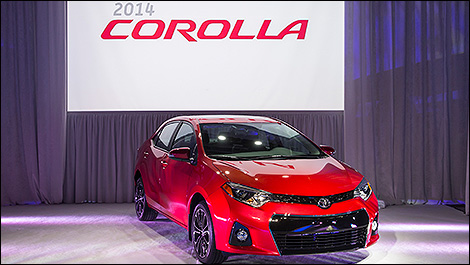Every Lamborghini enjoys the status of “rolling legend” the moment they launch. As the first cars roll off the assembly line, critics and enthusiasts cannot wait to see the latest from Sant'Agata.
The now-replaced Murciélago's output escalated from 580 horsepower to 670. For the
Aventador, Lamborghini wasted no time nor expenses in the power department as its 6.5L V12 produces no less than 700 horsepower and 507 lb-ft of torque.
Managing all that pavement-rippling muscle is the ISR gearbox or Independent Shifting Rod. The 7-speed tranny features rods operated by hydraulic actuators, which accomplish virtually parallel gear changes. According to Lamborghini, the overlapping allows shifts to occur 50% more quickly than in a double-clutch sequential.
In addition, the driver can choose between three operating modes: comfort-oriented Strada, dynamic Sport and track-calibrated Corsa, the latter including a launch mode for nosebleed blastoffs. You can use the wheel-mounted paddle shifters or leave the ISR to swap its own gears.
Speaking of blastoffs, the all-wheel drive Aventador crushes the 100 km/h in 2.9 seconds. The car also has a top speed of 350 km/h (217 mph).
The Aventador rides on a slightly longer wheelbase than the Murciélago and is barely longer, but loses an inch in width, while height is unchanged. Front and rear tires are sized at 255/35ZR19 and 335/30ZR20, respectively.
The Lambo flagship also benefits from carbon-ceramic brakes, dual front, side and knee airbags, traction and electronic stability control, bi-xenon headlights, rain-sensing wipers, a rearview camera, front and rear park sensors as well as electronically controlled rear spoiler and side air intakes.
Inside, you'll find a leather-trimmed cockpit with navigation system, Bluetooth connectivity, a USB port with iPod integration, an onboard computer, power and heated seats with four upholstery options including bicolour leather or Alcantara, climate control, and keyless entry and start. The steering wheel can be wrapped in suede or perforated leather, your choice.
 |
| Photo: Lamborghini |
The Aventador sports a sleek, wedge-shaped body that takes styling cues from the very rare and expensive Reventón, including the extrusive air intake ducts beneath the headlights and symmetrical creases all around as well as over the roofline. The engine is neatly exposed under a transparent hood, while a variety of paint colours and finishes (solid, metallic, pearl effect, and matte) are available. The scissor doors remain as a throwback to the Countach.
An even sleeker Roadster version is also available. The weight penalty for the Roadster over the regular fixed roof Aventador is only 50 kg or 110 lbs. The roof panels -- two of them -- each weighing 6 kg are easily stowed under the front bonnet. Acceleration times are only mildly affected, however, the top speed remains unaffected.
Pricing of the Lamborghini Aventador starts at $400,000.
 The latest auto news, reviews, prices, product and vehicle releases. Auto News 5
The latest auto news, reviews, prices, product and vehicle releases. Auto News 5




